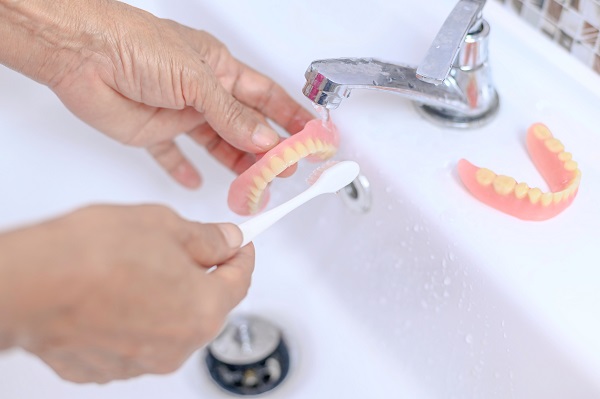Questions To Ask a Dentist Before Getting Dentures

There are many treatments available to restore missing teeth, but dentures are among the most common. They consist of appliances that are usually removable and consist of a base of hard acrylic or metal that supports artificial teeth. Their purpose is to restore oral function so that you can talk and eat more or less the way you used to before you lost your teeth. They also improve the appearance of your smile.
What should you ask a dentist before getting dentures?
As with any sort of dental treatment, dentures offer both advantages and disadvantages. Not everyone can benefit from them, but asking your dentist questions can help you determine whether they are a good treatment option for you.
How long do dentures last?
Treatment with dentures can last the rest of your life, but you will not necessarily keep your first set for that long. Due to a combination of wear and tear on the appliances and changes that occur in your mouth following tooth loss, a set of false teeth typically only lasts up to 10 years, at which point it has to be replaced or at least modified.
What types of dentures are available?
When it comes to traditional removable dental appliances, there are two types available. A full arch replaces all the teeth in the jaw, whether upper or lower. Partials attach to natural teeth remaining in the jaw to replace those that are missing. Either the lower or upper jaw can be treated with either type of denture. For example, if you have no teeth in your upper jaw but some healthy teeth remaining in the lower one, you can combine a full arch on the top with a partial on the bottom. Depending on the extent of your tooth loss, you could also have a full arch on both the upper and lower jaws or partials on both.
How do dentures work?
Each denture is custom-made to fit snugly on the gums. Partials are held in place by clasps or attachments that connect to the natural teeth. A full arch relies on suction created between the appliance and the gums to stay in place. In either case, the connection can be enhanced with the use of dental fixative, a type of adhesive that provides additional support when applied between the denture's base and the gums, preventing the appliance from shifting position.
How long does it take to get used to new dentures?
Keeping bulky items in your mouth during all your waking hours can be a challenge. During the initial adjustment period, you may experience minor soreness and irritation, excessive drooling, and facial muscle fatigue. These symptoms are expected and temporary. Factors unique to your situation may influence how long it takes you to get used to your new dentures, but it usually happens within a month, perhaps a few weeks with consistent wear.
How do you take care of dentures?
Whenever you are finished eating, be sure to run warm water over the dentures to loosen and remove any food particles or debris. You should also clean your mouth whenever you take out the appliance, using a soft-bristled toothbrush to remove any denture adhesive that is still on your gums. Keep the dentures soaking in a special denture-made solution to help keep them moist as well as to potentially remove bacteria. Just be sure to rinse them off thoroughly before reinserting them into your mouth.
Are there foods to avoid with dentures?
Although dentures replace missing teeth, there is a transition period when first having dentures inserted. You will need to eat soft foods during this period to give your gums and mouth time to adjust. Food should also be cut into small pieces to avoid excessive chewing during these first few days.
To help keep the dentures from moving too much during eating, try to place foods onto both sides of the mouth and chew evenly. Even with these precautions, you should avoid eating hard, crunchy foods like nuts, apples, popcorn, or carrot sticks as well as sticky foods or candies like caramels or gummy bears. Tough meats like ribs, steak, and pork can cause sore spots where the gums and dentures meet from all the grinding and chewing.
Conclusion
Asking your dentist questions about treatment with removable appliances helps you decide whether this is the right option to address your tooth loss. Dentures need to be cared for to help maintain the coloring and durability of the materials, and some adjustments may need to be made to your diet.
Request an appointment here: https://davisanddingle.com or call Davis & Dingle Family Dentistry at (803) 567-1804 for an appointment in our Columbia office.
Check out what others are saying about our dental services on Yelp: Dentures and Partial Dentures in Columbia, SC.
Recent Posts
The need for relining your dentures may not occur to you because of your busy schedule. But being aware of it can help you get relining services in time. Relining these restorations can help maintain your oral health and prevent discomfort. Here are the three signs you need to get relining services right away. Inspecting…
Dentures can be the perfect solution for missing one or multiple teeth. After all, your smile says a lot about you. The first thing a new acquaintance may notice about you is your teeth, and you want that first impression to be a pleasant one. Dentures can help restore your smile, but it's important that…
Partial dentures are one of the most cost-friendly and effective options for replacing missing teeth. They can either be removable or fixed dentures. This is a guide on what partial dentures are, their benefits, and how to care for them.Partial dentures, commonly known as partials, are artificial replacement teeth that replace a patient's missing teeth.…
Dentures can look great, but they won't look as good or last as long if you don't take care of them. Taking care of your artificial teeth means ensuring they're always clean, which involves more than just scrubbing them with toothpaste after every meal. It also means following certain steps to avoid problems down the…


